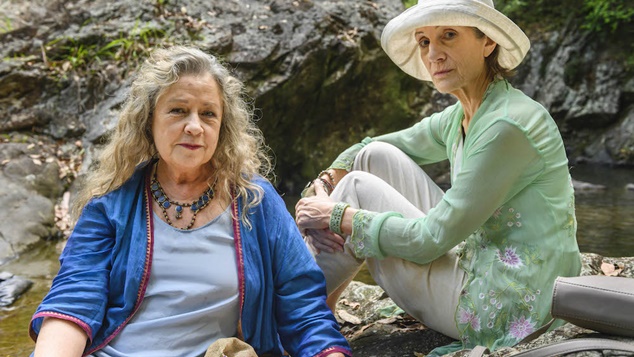
Warning: This article includes discussion about suicide and euthanasia.
Actor Noni Hazlehurst has chatted to podcast TV Blackbox about her latest role in The End. In the series Noni plays Pamela, a free-spirited lesbian woman who doesn’t exactly fit in with the rest of the elderly women in the retirement village she resides in.
Foxtel’s The End has a lot of diversity among its characters. The story follows three generations of women as the face the challenges of life, and the show tackles themes of suicide and euthanasia head on. Dame Harriet Walter is Edie, she’s moved to Australia and into the retirement village to be closer to her daughter, she’s passionate about her right to die. Her daughter Kate however is a palliative care nurse and opposing views on the topic. Kate has two children, one of them Oberon is a transgender teen who recently attempted suicide.
Added into the mix of intriguing and multi-faceted characters is Pamela, a micro-dosing, former entertainer, who is a quintessential hippy child of the 1960s. For Noni it’s a role that’s a long way from her days on Play School, and remarkably different to other parts she’s recently played like Bernice Waverly in City Homicide or uptight matriarch Elizabeth Blight A Place to Call Home. Speaking to Aaron Ryan, Noni shared what attracted her to the role.
“I think all actors, you know, want to play different kinds of roles to avoid being typecast. I’ve got a low boredom threshold, basically.” Noni said. “So, you know, six years of playing Elizabeth Bligh was a long time to play someone very stitched up and proper and disapproving and so on, although she did have a nice journey towards the end, where she fell in love for the first time and had a beautiful husband. But I took the role primarily because the whole series was so beautifully written and I thought very relevant and important in its subject matter. But also because the character was a complete contrast to Elizabeth Bligh.”
Noni also didn’t hesitate in highlighting one of the biggest differences in her new role. One of the shows more surprising moments comes in its second episode when Pamela undertakes some topless sunbathing.
“I have done nude scenes,” telling interviewer Aaron Ryan it was probably before he was watching her on Play School, “In films like Monkey Grip and Waiting and things like that. But it’s been a while since I got my tits out.” Noni added.
Aaron Ryan asked Noni if she had any hesitation about the nude scene, especially as so many members of the audience would have grown up knowing her from Play School.
“Did you have any thoughts behind that your Play School audience we’re about to see their idol get naked? I mean, what would Jemima and Big Ted think!” he asked, making reference to the show’s iconic toy characters.
“Jemima and Big Ted get up to all sorts of nefarious activities when the lights are off.” Noni joked, before sharing she’s already shattered her wholesome image when she created a YouTube video a few years ago where she read the book Go The Fuck to Sleep.
Noni as also asked about a controversial Play School segment that aired in 2004, where a segment highlighted a child who had two mothers, and Noni had some very specific thoughts on how children react to content about sexuality and gender.
“No child is born a bigot. No child is born a racist. No child is born, you know, with with a judgment inherent in the nature.” Noni said. “They learn that, and Play School really has always been at the forefront of just saying ‘This is the situation’ and a three, or four, or five year-old child will go ‘Okay’.
“It’s the adults who get their knickers in knot, because they think that we’re infecting, you know – that their children’s minds are being infected. Now, their children’s minds are not being infected, their children’s minds are taking in influences from everywhere around them. And if they’re told that something is bad, or horrible or dirty, then it is, but if they’re not, they will learn themselves, what is acceptable and what they can cope with.
“They will learn that people are very different. I mean, Native Americans have seven different words for gender in their languages. Well, it’s not just binary, so I think adults can be incredibly closed minded, and young children are much more resilient than we think.” Noni shared.
Brenna Harding, who was the little girl in the 2004 Play School segment, went on to appear alongside Noni in A Place to Call Home.
Head to TV Blackbox and listen to the podcast. Want to read more about The End – check out our interviews with cast member Morgan Davies and script consultant Andrew Guy.
OIP Staff
Do you need some support?
If you are struggling with anxiety or depression, support and counselling are available from:
Lifeline: 13 11 14 or lifeline.org.au
Beyondblue: 1300 22 4636 and www.beyondblue.org.au
QLife: 1800 184 527 and www.qlife.org.au
QLife are a counselling and referral service for Lesbian, Gay, Bisexual, Transgender and Intersex (LGBTI) people.

Love OUTinPerth Campaign
Help support the publication of OUTinPerth by contributing to our
GoFundMe campaign.





